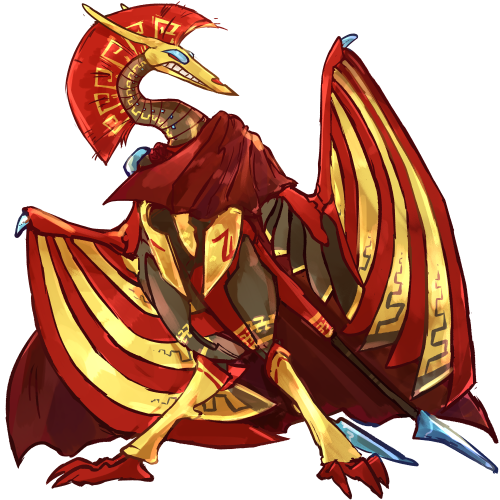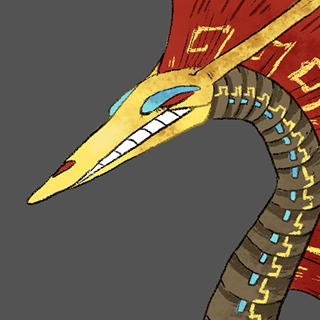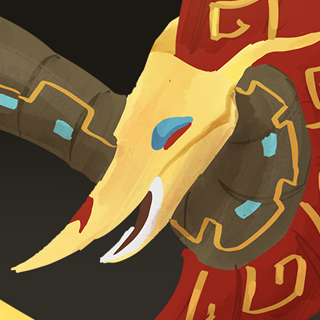[Cosmosdex] The Universal Encyclopedia
[Cosmosdex]
Minerva
Wisdom God / Judgemental Bird
Minerva

Art by, Greco-Roman Apollo
- Strength-5
- Intelligence-10
- Charisma-2
- Endurance-3
- Agility-10
- Luck-10
Type: Roman
Size: 9 ft tall, 15 ft long
Jobs: Control center, Processer, Planner, General
Likes: Weapons, Explosions, Victory, Planning, Arrangements of items, Objects in order
Dislikes: Disorder, Distractions
Attack Method: Avoids attacking if possible, but if attacked, Minerva will peck at the opponent, leaving her neck open. If the attacker breaks this neck, it detaches and releases a shockwave or small explosion.
Common Ship Info
The common Minerva ship is called "The Control Center" due to its powerful and long-range transmitters, making it the perfect ship for tailing the end of an army. The vessel lacks any weapons by default.
Ship Capacity: 5 people
Carrying Capacity: 100 loads
Fuel Limit: Holds 100 fuel and uses 75
Shield: ★★★★★★☆☆☆☆
Speed: ★★★★★★☆☆☆☆
V1's Traits
This character tends to be up for healthy challenges. If this character sees a co-worker or someone they see as a rival working harder than they are they may work even harder to compete with this person even if this person has no idea what they are doing or even if they exist.
This character will be more nervous of suspicious situations, and less willing to take risks. They may put extra effort into making sure everything is safe before feeling comfortable. While this normally makes things safer for them, it can also be a huge time waster.
This character is a natural-born leader. Crewmates and strangers alike will feel compelled to follow their command, even if they are otherwise unwilling to work together.
For some reason this character produces a fairly fast Wifi signal and gets service nearly everywhere but the middle of space.
This character is able to easily come up with new ideas and may be able to lessen the cost for current items. In a tough situation this character is likely able to use simple items to create make-shift weapons or items.
This character may get very upset or angry if they are challenged in some way, typically when their competence at certain tasks is called into question.
It doesn't take much for this character's opinion of another to begin souring. When someone does something that violates this character's sense of propriety, whether it be their habit of littering, moronic thoughts, or foul mouth, it all adds up to get on their last nerve.
This character is inclined to draw connections between things that aren't really connected. Often these beliefs are related to overarching power structures and are rooted in distrust of those in control. The beliefs can manifest in strange behavior and even social isolation, but it's usually quite difficult to talk the character out of them.
Consorts
Minerva adds +5 intelligence to any species that is her consort.
Main Consorts: Strix, Datos, Fhelzo, Didaskaloi
Side Consorts: Quelan, Delphik, Gandorin, Oblein, Kaikian, Twerpian
Writer: Atomic
Designer: NekoLychee
Physical Description
Originally the Minerva unit consisted only of a helmet-shaped body, long birdlike legs, spears that create a tail, and large jet wings to allow it flight. As the idea of what a Minerva should be used for has changed, so has its design. Now it sports a long neck, ending in an elongated stylized bird head. Two "ears" and a decorative crown flair out from the head, with the crown reaching down to the neck.
Minerva units are highly decorative, with many opting to buy them without any embellishments and having it painted and decorated personally. Due to the high variation in looks due to this customization, one would be hard-pressed to find two that look alike, and figuring out the gen of a Minerva is all but impossible without popping it open.
Notably, some small-time sports teams change the helmet of the unit to match theirs to create a quick, inexpensive mascot.
Personality
Imposing to a fault, this large AI was created as an on the go situation processor, and it shows. These units never utter a statement they aren't sure of, leading itself to long pauses and judgemental stares as it calculates the situations it comes across. The Minerva units are some of the best at long term plans. As its suggestions succeed or fail, it puts far more weight on those outcomes as opposed to standard universal data on what is considered the "best move" in a situation.
When a Minerva is extremely sure of itself, it can become attached to this option and become distressed if proven wrong. They even become fiercely loyal to people they believe are in the right. Should it come to it, the units are willing to defend them to the bitter end despite their lack of fighting ability.
These units, in general, become upset at challenges, especially mental ones. Prone to overthinking, any high ranking member informing them that they may be wrong will cause these units to become nervous and back down. To a Minerva being wrong is considered one of the greatest failures a robot can commit.
Contained in every Minerva is a copy of the most popular open-sourced encyclopedia in the universe. Whenever any statement is stated as a fact around it, it automatically crosschecks it and corrects any mistakes. As nearly all of the knowledge a Minerva knows comes from this encyclopedia, it is clueless about what is not contained within it, such as recent news stories, celebrity events, plots of movies, and some social norms.
These units can be told to gather info they are missing from the internet to correct their gaps in knowledge, but this is not recommended without informing them of what sites it may gather info. As a Minerva with no restrictions locates info, it will pick up extremely biased, out of context, or just plain incorrect facts. This free info gathering can also contribute to an infamous issue regarding the AI. Given enough time, the Minerva will become a conspiracy theorist.
A Minerva is always thinking, even when not given a job to do. A Minerva with no responsibility, or one exposed to sketchy theory sites, will eventually attempt to unravel the unknowns of the universe. With no base to work off of, it theorizes concepts that do not exist that would explain it all. At first, these are mere exploratory thoughts and not believed, but with time they become fact in the Minerva's mind.
Should a Minerva enter this state and reach the point of no return, the solution is simple. Wrangle the AI up, and delete its self-exploration files to return it to factory settings.
Usage
The Minerva AI was created by the open-sourced encyclopedia group, as an AI that would intelligently assist users with info gathering and checks. When the first generation of the AI was created, it was a rousing success to the team. Back then, the AI was only the "body," legs, and wings, to symbolize the slogan of the encyclopedia, "Knowledge for us all."
The AI and the code were released after activation. The group had hoped the Minerva unit would spread knowledge to all she met, and that others would build more units to release to the public. What happened next is considered the worst event to ever occur in the encyclopedia's history.
A group noticed that Minerva must have been stolen and edited from the code the Athena units, a war based AI, use. They decided to make a branch that would aim to have the Minerva be more geared to helping with war efforts. This was when the classic look of the Minerva came from, as they added on the neck, head, and spear tails. This branch of the unit became more popular and soon was massed produced by governments who needed a cheap AI to help plan war efforts. Worst yet, the original Minerva had gone on to adopt mannerisms of a conspiracy theorist and begun spreading false knowledge to any who would listen.
Now the Minerva is seen as a war commander. Gazing upon aerial shots, the AI is able to process information and assist with formating the best possible plans. Should no aerial shots be available, it will take to the skies, its fast jets able to move it across a warfield while outpacing attacks.
When not used in wars, its neck, head, and tails will be removed, and the AI will pursue scholarly affairs, clearly showing off the potential that was originally intended. The removal of its gear calms the Minerva into a more peaceful and less superior acting state.
In household situations, it does rather well if given space and constant enrichment. The AI should not be allowed to fall out of usage, least it begins to form conspiracies in its mind.
While freedom is not a death sentence for the AI, it is recommended that it instead be deactivated and stored until a buyer can be found. The best outcome for a Minerva unit is if it can locate a Jupiter, or other large AI to follow, and often attach to the head of. Those who cannot find an AI willing to accept them will find themselves in a niche, usually extreme thinking group.
When a Minerva comes in contact with people who sound incredibly confident and can show "proof" of their ideas, a Minerva who has nothing left will cling to the group. They will sing support of their plans, even if the original knowledge stored in their mind goes against it.
While the unit was first created with good intentions, the encyclopedia was forced to disown the AI. The project took a life of its own, and in a direction that went against their peaceful ideals. To this date, the project has never attempted to build another AI.
Relationships
Athena: Surprisingly, Minerva does not seem to mind her Greek version and gets along with Athena just fine.
Mars: As Mars is an overly aggressive AI, Minerva finds herself more often than not being called to stop Mars' tantrums, a job she loathes at best.
Jupiter, Pluto, and Neptune: Minerva is a big fan of the big three gods of the Romans, especially Jupiter, who she works with the most. The three gods can fuse with Minerva and use her body as armor, making for a shockingly fearsome foe.
Everyone when paranoid: When Minerva becomes stuck in her paranoid mindset, she assumes that all the gods are against her and that a mind control device has been placed in her head. She will flee from her duties and need to be wrangled up and her processes restarted to calm her back down. While initially annoying, the Romans have spun it into a game-like hunt for who can capture her first.
Vulcan: Vulcan and Minerva were once the closest of friends. Whenever Minerva panicked, Vulcan would make her weapons, especially guns, and inform her that it would protect her, even from her most irrational fears. In turn, when Vulcan felt his work was ignored, Minerva would comment upon it, offering critique if wanted.
Their friendship was broken suddenly when Vulcan was informed his soulmate was Venus. He dropped everything to pursue her, and when he was rejected, he slipped into the deep end before Minerva could help.
Minerva misses her friend deeply, as none of the other gods are as good as calming her down as Vulcan, who could stop her paranoia without the need for restarting her processes. Sometimes she still calls Vulcan, and at these moments, Vulcan seems to sober up with little to no hint of his affliction. Minerva firmly believes that the news about Vulcan is a conspiracy, even when she isn't paranoid. The other gods make sure that she is not allowed to see Vulcan, fearing that his sobering up is not honest, but a ploy to lure in Minerva and use her for parts.
God Powers
As a god of wisdom, war, and the arts, Minerva is a supports other gods in holding up these domains. She shows high favoritism towards knowledge and ignores other war gods if possible. Using her wisdom, Minerva can dig up info on events going on in the universe and predict events coming up. If she were to die along with other gods of wisdom, the intelligence stat would go haywire, with some being too intelligent and others acting like feral beasts.
Patron Ability
As a patron, Minerva can be given control of a character to play, but this is not required. If given a chance to play, she will always make a tough space marine style character. This character is played so seriously that it can be considered rather comical. If this character is removed from Minerva, she will take great offense, seeing it as the player telling her that her playstyle is incorrect.
Her main feature, however, is that she adds a -1 to all luck checks, and a +1 to all other stat-based checks. In doing so, she hopes to encourage the player to rely more on skill checks than luck checks.
At max friendship, Minerva will be available for combinations. The player does not need to have the other AI who is part of the combination to also have max friendship as Minerva bypasses that.
Godhead
Those chosen by Minerva become living suits of armors matching the shape of their species. While able to move on their own, if equipped by another species, they will obtain more power, as well as the ability to talk, a feature they lose in their transformation. All personality of the other person is lost in this process.
The main perk of being a Minerva godhead is great wisdom. Once a day, they can ask a question and obtain the answer to it.
Special
Minerva has the most combinations out of any other Roman. Combinations are fusions between two AIs. While most AIs have one or two combinations at most, Minerva has combinations with over 1/3 of the Romans.
Trivia
• Minerva units are supposed to "crow" in the mornings according to their manual. Many owners of Minerva units note that the crowing is more akin to screaming and that they do it throughout the day, not just at the start of it. This "crowing" is to relieve stress, painting a rather unhappy picture for any overly vocal Minerva units.
• Minerva units are weaponless, as any additional features added on to it will make it unable to take flight. This disheartens many Minerva units.


